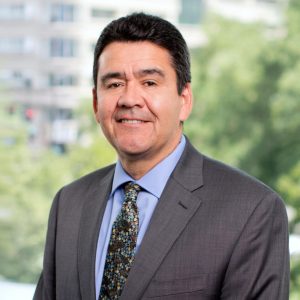Biden picks Taos Pueblo member for top post

This week, confirmation hearings got underway in Washington, D.C., to approve several picks by the Biden administration for top military posts, which include a Taos Pueblo tribal member.
Nominees set to testify include former Rep. Gil Cisneros, Biden’s pick to be undersecretary of Defense for personnel and readiness; Kathleen Miller, to be deputy Pentagon comptroller; Mara Karlin, to be assistant secretary of Defense for strategy, plans and capabilities; and Michael Connor, a Denver attorney with family ties to Taos Pueblo, to be assistant Army secretary for civil works. The White House announced Connor’s nomination last April.
Previously, Connor served as Deputy Secretary of the U.S. Department of the Interior (2014-2017) and was on the short list to head Interior before Laguna Pueblo Native Deb Haaland was confirmed to the post.
The longtime New Mexican is said to be a partner in the law firm of Wilmer Cutler Pickering Hale and Dorr, LLP in Denver, Colorado, where he lives with his wife Shari, and children Gabriela and Matthew. The website for his firm states his “practice focuses on natural resources, energy development, environmental compliance and Native American law. He provides strategic advice, counseling, legal and legislative support to businesses, tribes and other entities, helping them navigate complex policies, statutes, regulations and treaties associated with the use, conservation, and protection of natural resources.”
Taos Pueblo Gov. Clyde M. Romero Sr. said he and his staff met with Connor when he was home last April.
“He is the grandson of the late Patricio Romero of Taos Pueblo,” Romero said in a tribal statement. “Patricio Romero was a former Taos Pueblo Governor in the 1980s. Patricio was a very traditional elder that served for many years on the Taos Pueblo Water Taskforce, a group designated by the Tribal Council to support the water settlement that became final in 2017 under President Obama’s administration.”
Romero added that Connor is “following in his grandfather’s footsteps … [and] had a hand in supporting in the Taos Pueblo Water settlement when he worked as the Commissioner of the Bureau of Reclamation (2009-2014). From 2001 until 2009, Connor was counsel to the U.S. Senate Energy and Natural Resources Committee and previously served in the Solicitor’s Office at the Interior Department and as director of the secretary’s Indian Water Rights Office.”
Romero said he looks forward to “working with Assistant Army Secretary Connor providing support and comment on important tribal issues and concerns. We wish him the best in his new capacity and all our prayers and strength to him.”
In his July 13 opening statement before the Senate Armed Services Committee, Connor said the position for which he is nominated “is an important position under any circumstances given the responsibilities of [the United States Army Corps of Engineers] for Infrastructure; Ecosystem Health; Maintaining Waterways; Managing Flood Risks; and Protecting Wetlands.
These are all incredibly important functions for communities across the nation. Today, these responsibilities take on new significance amid the backdrop of a pandemic-impacted economy that must also build resiliency to the effects of climate change, while ensuring equity amongst the communities being served.”
In his statement, Connor referenced his background, saying, “If confirmed, my personal background will also inform my views as I oversee the vast responsibilities associated with the Corps. I grew up in New Mexico, a state rich in natural resources (except water) and which has a land base that is one-third in federal ownership.”
He said he is “proud of my Native American heritage and my roots in an agricultural community, Las Cruces, N.M. I grew up witnessing, on a daily basis, the important role the Federal government plays in supporting and protecting the economic foundation of many communities and providing access to the recreational resources that enhance the quality of life for our citizens.”
The White House states that the majority of Connor’s career “has been in the public sector.” While at Interior, he was “a key leader in implementing the Administration’s priorities for the Department, including establishing water policies and strategies to address an unprecedented Western drought; promoting renewable energy development on public lands and the outer continental shelf; developing science-based strategies to support landscape-level management of public lands; and taking actions to improve the federal government’s fulfillment of its trust responsibility to Native Americans.”
Prior to serving as Deputy Secretary, the White House states that Connor served as the Commissioner of the Bureau of Reclamation from 2009-2014 where “he led efforts to integrate climate science and resilience actions into water resource management. He also forged major Indian water rights settlements and led the Department of the Interior’s negotiations to complete two major binational agreements with Mexico on the Colorado River.”
In the early 2000s, he served as counsel to the U.S. Senate Energy and Natural Resources Committee and previously served in the Department of the Interior in the Solicitor’s Office, and then as director of the Secretary’s Indian Water Rights Office. Connor received his J.D. from the University of Colorado and a Bachelor of Science degree in Chemical Engineering from New Mexico State University.
